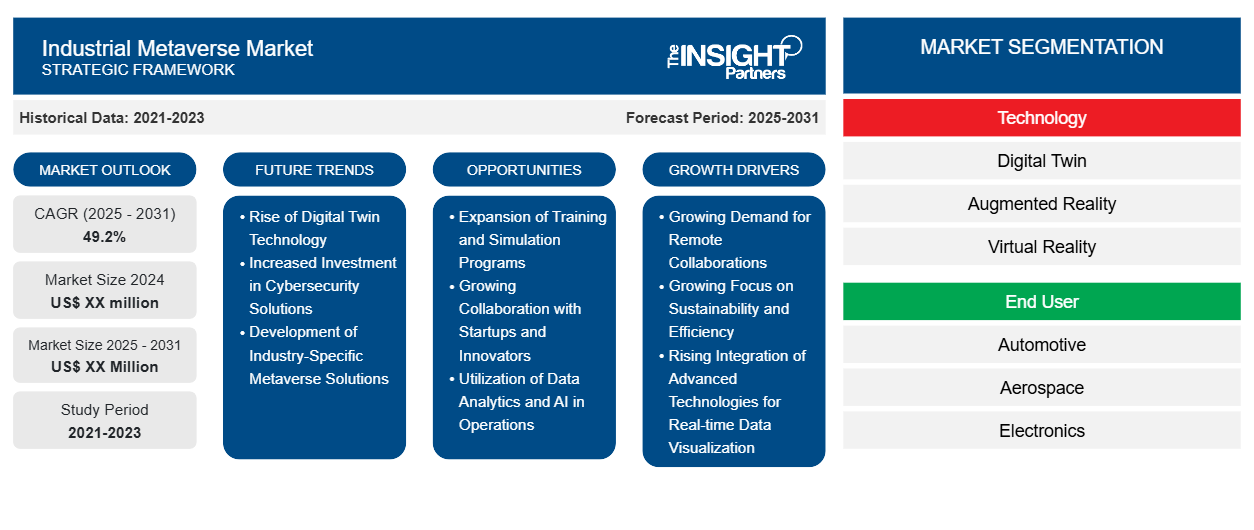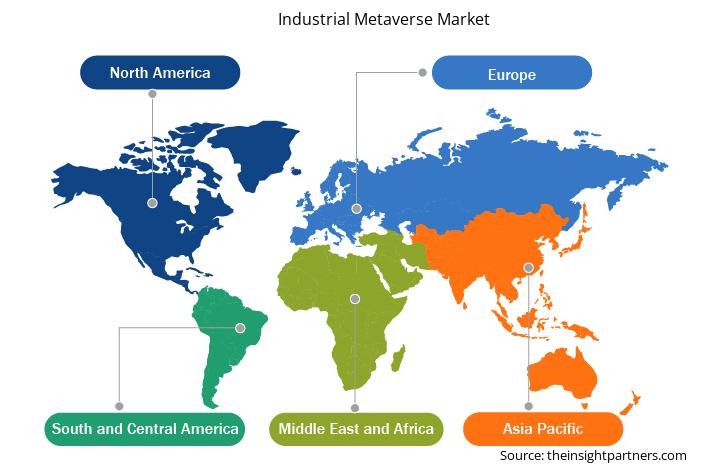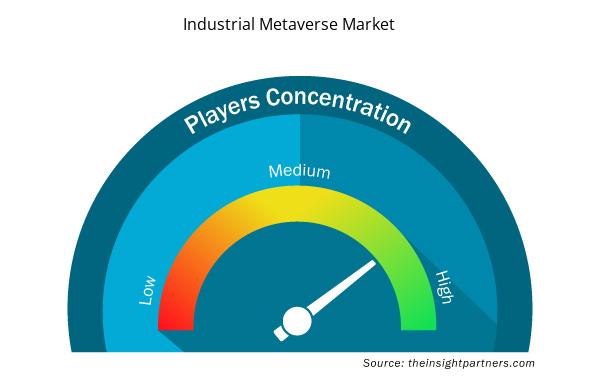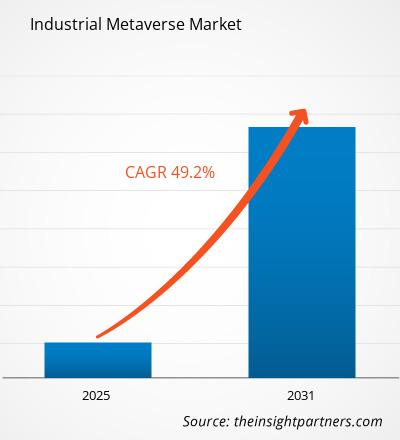The Industrial Metaverse Market is expected to register a CAGR of 49.2% from 2025 to 2031, with a market size expanding from US$ XX million in 2024 to US$ XX Million by 2031.
The report is segmented by Technology (Digital Twin, Augmented Reality, Virtual Reality, Artificial Intelligence, Edge Computing, Private 5G, Blockchain), End User (Automotive, Aerospace, Electronics, Healthcare). The global analysis is further broken-down at regional level and major countries. The Report Offers the Value in USD for the above analysis and segments.
Purpose of the Report
The report Industrial Metaverse Market by The Insight Partners aims to describe the present landscape and future growth, top driving factors, challenges, and opportunities. This will provide insights to various business stakeholders, such as:
- Technology Providers/Manufacturers: To understand the evolving market dynamics and know the potential growth opportunities, enabling them to make informed strategic decisions.
- Investors: To conduct a comprehensive trend analysis regarding the market growth rate, market financial projections, and opportunities that exist across the value chain.
- Regulatory bodies: To regulate policies and police activities in the market with the aim of minimizing abuse, preserving investor trust and confidence, and upholding the integrity and stability of the market.
Industrial Metaverse Market Segmentation
Technology
- Digital Twin
- Augmented Reality
- Virtual Reality
- Artificial Intelligence
- Edge Computing
- Private 5G
- Blockchain
End User
- Automotive
- Aerospace
- Electronics
- Healthcare
Customize This Report To Suit Your Requirement
You will get customization on any report - free of charge - including parts of this report, or country-level analysis, Excel Data pack, as well as avail great offers and discounts for start-ups & universities
Industrial Metaverse Market: Strategic Insights

- Get Top Key Market Trends of this report.This FREE sample will include data analysis, ranging from market trends to estimates and forecasts.
Industrial Metaverse Market Growth Drivers
- Growing Demand for Remote Collaborations: The COVID-19 pandemic has accelerated the need for remote collaboration tools, significantly boosting the industrial metaverse market. As organizations seek to maintain productivity while ensuring employee safety, virtual environments allow teams to collaborate seamlessly across geographical boundaries. This shift towards remote work and collaboration is driving investments in metaverse platforms that facilitate real-time communication, training, and project management, making it easier for companies to operate efficiently in a hybrid work model.
- Growing Focus on Sustainability and Efficiency: Companies are increasingly prioritizing sustainability and operational efficiency, propelling the growth of the industrial metaverse. By utilizing digital twins and virtual simulations, organizations can analyze processes and identify areas for improvement with minimal environmental impact. The ability to model different scenarios in a virtual space enables industries to test sustainable practices without the financial and ecological costs associated with physical implementations. This focus on sustainable development is becoming essential for companies aiming to align with global sustainability goals.
- Rising Integration of Advanced Technologies for Real-time Data Visualization: The industrial metaverse is being driven by the rapid integration of advanced technologies such as augmented reality (AR), virtual reality (VR), artificial intelligence (AI), and the Internet of Things (IoT). These technologies enable immersive simulations and real-time data visualization, enhancing operational efficiency and decision-making processes. Companies are leveraging the industrial metaverse to create digital twins of their operations, allowing for better monitoring, predictive maintenance, and optimization of resources, ultimately leading to cost savings and improved productivity.
Industrial Metaverse Market Future Trends
- Rise of Digital Twin Technology: One of the most significant trends in the industrial metaverse is the growing adoption of digital twin technology. Digital twins are virtual representations of physical assets, processes, or systems that provide real-time insights into performance and operations. This technology allows businesses to simulate different scenarios, monitor equipment health, and predict failures, enhancing operational efficiency. As industries increasingly recognize the value of digital twins, their implementation across sectors such as manufacturing, logistics, and energy is becoming more prevalent.
- Increased Investment in Cybersecurity Solutions: As the industrial metaverse expands, the need for robust cybersecurity measures is becoming increasingly critical. The integration of digital technologies exposes organizations to various cyber threats, making it essential to safeguard sensitive data and operational integrity. Companies are investing in advanced cybersecurity solutions, including encryption, threat detection, and response systems, to protect their virtual environments from potential breaches. This trend highlights the importance of cybersecurity in fostering trust and ensuring the safe adoption of metaverse technologies in industrial settings.
- Development of Industry-Specific Metaverse Solutions: There is a growing trend towards the development of tailored metaverse solutions for specific industries. Companies are recognizing that one-size-fits-all approaches may not be sufficient to meet the unique needs of various sectors, such as manufacturing, healthcare, and logistics. As a result, industry-specific platforms are emerging, offering customized features and functionalities that address the distinct challenges faced by each sector. This trend is likely to drive greater adoption of the industrial metaverse as organizations seek solutions that align with their operational requirements.
Industrial Metaverse Market Opportunities
- Expansion of Training and Simulation Programs: The industrial metaverse presents significant opportunities for enhancing training and simulation programs. Organizations can leverage immersive virtual environments to provide realistic training experiences for employees, allowing them to practice skills and procedures without the risks associated with real-world scenarios. This approach can lead to improved knowledge retention and better preparedness for on-the-job challenges. As companies prioritize workforce development, investing in metaverse-driven training solutions can lead to a more skilled and competent workforce.
- Growing Collaboration with Startups and Innovators: The industrial metaverse market is ripe for collaboration between established enterprises and startups specializing in metaverse technologies. Many innovative startups are developing cutting-edge solutions that can benefit traditional industries, such as manufacturing and logistics. By partnering with these innovators, established companies can accelerate their adoption of metaverse technologies, enhance their operations, and access new markets. This collaborative approach can drive innovation and create a more dynamic industrial ecosystem.
- Utilization of Data Analytics and AI in Operations: There is a substantial opportunity for organizations to harness data analytics and AI within the industrial metaverse to optimize their operations. By analyzing vast amounts of data generated from connected devices and digital twins, companies can gain valuable insights into performance trends, resource utilization, and predictive maintenance needs. This data-driven approach can lead to enhanced decision-making, reduced downtime, and improved overall efficiency. As businesses continue to embrace data analytics, the industrial metaverse will play a crucial role in driving operational excellence.
Industrial Metaverse Market Regional Insights
The regional trends and factors influencing the Industrial Metaverse Market throughout the forecast period have been thoroughly explained by the analysts at Insight Partners. This section also discusses Industrial Metaverse Market segments and geography across North America, Europe, Asia Pacific, Middle East and Africa, and South and Central America.

- Get the Regional Specific Data for Industrial Metaverse Market
Industrial Metaverse Market Report Scope
| Report Attribute | Details |
|---|---|
| Market size in 2024 | US$ XX million |
| Market Size by 2031 | US$ XX Million |
| Global CAGR (2025 - 2031) | 49.2% |
| Historical Data | 2021-2023 |
| Forecast period | 2025-2031 |
| Segments Covered |
By Technology
|
| Regions and Countries Covered | North America
|
| Market leaders and key company profiles |
Industrial Metaverse Market Players Density: Understanding Its Impact on Business Dynamics
The Industrial Metaverse Market market is growing rapidly, driven by increasing end-user demand due to factors such as evolving consumer preferences, technological advancements, and greater awareness of the product's benefits. As demand rises, businesses are expanding their offerings, innovating to meet consumer needs, and capitalizing on emerging trends, which further fuels market growth.
Market players density refers to the distribution of firms or companies operating within a particular market or industry. It indicates how many competitors (market players) are present in a given market space relative to its size or total market value.
Major Companies operating in the Industrial Metaverse Market are:
- NVIDIA Corporation
- Microsoft
- Siemens
- Amazon Web Services, Inc.
- IBM
Disclaimer: The companies listed above are not ranked in any particular order.

- Get the Industrial Metaverse Market top key players overview
Key Selling Points
- Comprehensive Coverage: The report comprehensively covers the analysis of products, services, types, and end users of the Industrial Metaverse Market, providing a holistic landscape.
- Expert Analysis: The report is compiled based on the in-depth understanding of industry experts and analysts.
- Up-to-date Information: The report assures business relevance due to its coverage of recent information and data trends.
- Customization Options: This report can be customized to cater to specific client requirements and suit the business strategies aptly.
The research report on the Industrial Metaverse Market can, therefore, help spearhead the trail of decoding and understanding the industry scenario and growth prospects. Although there can be a few valid concerns, the overall benefits of this report tend to outweigh the disadvantages.
- Historical Analysis (2 Years), Base Year, Forecast (7 Years) with CAGR
- PEST and SWOT Analysis
- Market Size Value / Volume - Global, Regional, Country
- Industry and Competitive Landscape
- Excel Dataset



Report Coverage
Revenue forecast, Company Analysis, Industry landscape, Growth factors, and Trends

Segment Covered
This text is related
to segments covered.

Regional Scope
North America, Europe, Asia Pacific, Middle East & Africa, South & Central America

Country Scope
This text is related
to country scope.
Frequently Asked Questions
The leading players operating in the Industrial Metaverse Market include NVIDIA Corporation, Microsoft, Siemens, Amazon Web Services, Inc., IBM, Meta, HTC Corporation , ABB, Dassault Systèmes, GE Vernova
The report can be delivered in PDF/PPT format; we can also share excel dataset based on the request.
Rise of Digital Twin Technology, Increased Investment in Cybersecurity Solutions, Development of Industry-Specific Metaverse Solutions is the key future trend of the Industrial Metaverse Market
The major factors driving the Industrial Metaverse Market is Growing Demand for Remote Collaborations, Integration of Advanced Technologies, Focus on Sustainability and Efficiency
The global Industrial Metaverse Market is expected to grow at a CAGR of 49.2% during the forecast period 2024 - 2031.

 Get Free Sample For
Get Free Sample For